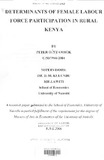| dc.contributor.author | Ambok, Peter | |
| dc.date.accessioned | 2013-05-07T15:22:29Z | |
| dc.date.available | 2013-05-07T15:22:29Z | |
| dc.date.issued | 2006 | |
| dc.identifier.uri | http://erepository.uonbi.ac.ke:8080/xmlui/handle/123456789/19960 | |
| dc.description.abstract | This study analyses the factors that determine female labour force participation in the rural
areas in Kenya with a view to identifying appropriate policy formulations that can help raise
their labour force participation rate. The study uses the 1998/99 Integrated Labour Force
Survey data which collected information on labour force participation status as well as
information relating to the various socio-economic characteristics of the individual rural
females. The analysis is a probit estimation of the labour force participation status which is
dependent on the various socio-economic characteristics. The study findings show that formal
education increases participation and that marital status is not an important factor in
determining female labour force participation in rural areas. Other noted factors that
positively influence female labour force participation are household headship status, household
income, number of school going children and number of pre-school going children in a
household. Household size was found to discourage participation. The findings suggest that
the government should increase its investment towards women's education so as to increase
their labour force participation. | en |
| dc.description.sponsorship | The University of Nairobi | en |
| dc.language.iso | en | en |
| dc.subject | Determinants of female labour force | en |
| dc.subject | Rural Kenya | en |
| dc.title | Determinants of female labour force participation in rural Kenya | en |
| dc.type | Thesis | en |
| local.publisher | Department of Economics | en |

